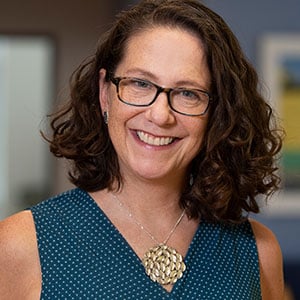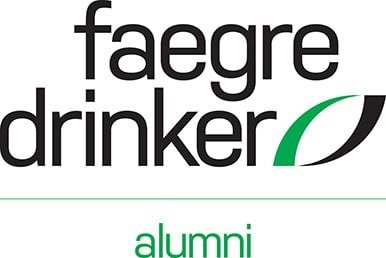
Name: Anita Cicero
Title: Deputy Director and COO – Johns Hopkins University’s Center for Health Security
Firm Background: Partner, May 1997 – February 2019
Office: Washington, D.C.
When Anita Cicero left the legacy Drinker Biddle firm in 2010 to take her current post as Deputy Director and COO at Johns Hopkins University’s Center for Health Security, many people found her new organization’s mission confounding.
“When I told people what I’d be doing — working in biosecurity and health security — so many people said, ‘What does that mean?’” Anita said. “The Center works to protect people’s health from the consequences of epidemics and other biological disasters, whether they’re naturally occurring, deliberately caused or accidentally released in a lab accident. The world didn’t really know about these issues, and I’m sure a lot of people just viewed it as a group of experts toiling away in obscurity.”
Of course, these obscure topics have since come to the fore in the effort to solve the biggest crisis confronting humanity — and Anita is central to that undertaking. Unlike a traditional in-house lawyer, Anita heads operations for the Center, leading a team that includes emergency physicians, infectious disease specialists, anthropologists, economists, immunologists, other scientists, social scientists and public health professionals. Since the beginning of 2020, the Center has been supporting government decision-making in the COVID-19 response, helping leaders confront what she refers to as “high-level policy dilemmas that have no easy answers.”
“We have provided advice to the White House, to the Centers for Disease Control and Prevention, the Department of Health and Human Services, the Department of Defense, some foreign governments, governors, mayors and other local government leaders,” Anita said. “We had a person working pretty much full-time to help with COVID-19 protocols for the Olympics, and we helped to develop the protocols for the ceremonies surrounding President Biden’s Inauguration.”
Earlier this year, Anita testified before the Senate Health, Labor, Education and Pensions Committee on lessons learned from COVID-19 and how they may inform enhanced preparation measures. Much of her testimony (and part of the Center’s work) is reflected in the Disease X Act, legislation introduced by U.S. Sen. Tammy Baldwin (D-WI) in August. The Act, as Anita said when it was introduced, establishes a “medical countermeasure program” that “will enable the U.S. to rapidly develop drugs, diagnostics and vaccines against unknown viral threats in order to save lives and safeguard the economy in future events.”
To put it mildly, it has been an eventful two years for Anita. But what led her to her current role on the forefront of the pandemic response?
‘A Winding Path’
As a high schooler, Anita was sure of one thing: she wanted to go to law school. But after that, the path became a little less clear.
“Like many young people, I think it was hard for me to envision a career in law that wasn’t litigation,” Anita said.
That initial interest led her first to a job in the enforcement section of the Department of Justice’s Environment and Natural Resources Division, where she tested an ambition to be an environmental lawyer. She then joined the environmental practice at a law firm, where she continued to work as a litigator.
“It took me a while to figure out that litigation wasn’t the best fit for my natural gifts and talents,” Anita said. “I kind of pursued a winding path from there.”
Fortunately, Anita’s path would cross with Jim Jamieson, who was then a partner at Gardner Carton & Douglas, where he helped to run the pharmaceutical consortium practice. Jamieson, who, like Anita, would go on to become a partner at Drinker Biddle, brought her into the consortia space.
“I was really enticed by the international aspect of the consortia and the prospect for international travel,” Anita said, looking back fondly on trips to Timbuktu, Burkina Faso, China and Japan, and wonderful meetings with European and international clients and colleagues. However, she also came to appreciate the less contentious nature of the work — a welcome change of pace from her litigation experience.
“Rather than coming into an adversarial situation and advising the client on how to win, it was much more about bringing players together to come up with a common purpose and a common set of goals that everyone could agree to,” Anita said. “These goals may be more policy-oriented, or regulatory-oriented, but they weren’t often legal per se.”
That many pharmaceutical clients were also working to advance important missions was also something that Anita found gratifying.
“Through their work, these companies can help cancer patients. They can help defeat malaria, they can really change people’s lives for the better,” Anita said. “That appealed to me as I considered, you know, how do you make a positive change in the world? I think this led me to where I am now, where through policy and advocacy I can help to bring about my own kind of change.”
Though her career has taken on a different trajectory, Anita views the skills and experience she gained at Drinker Biddle as foundational to her work at the Center.
“I do think the firm prepared me for the role I am in now,” Anita said. “So much of what I do is really an art of negotiation and compromise and building bridges between parties. And when it comes to working with public health or pandemic experts, oftentimes they know the ‘right way’ to do something — but there are the realities of life and governance and politics and resources that will get in the way of the perfect solution. You have to find a sweet spot. You learn how to do that in a law firm environment, both serving clients and working with colleagues. We are all supportive of each other, but we still have to navigate a group dynamic, learn to make compromises among competing interests, and come up with solutions.”
What’s Next?
In the coming months, Anita hopes to grow the Center both from a personnel and a funding perspective. And while much of her time is still occupied with addressing the external challenges of a pandemic, she also wants to continue to help her team navigate the difficulties of life in COVID-19.
“I’m reading a book called Turbulence by Monique Maley, which is about how to bring an organization through turbulent times,” Anita said. “For our team, there is a lot of burnout. It has been an intense period of time, and I’m spending a lot of time thinking about how to lead the team through that and how to best communicate with everyone through it. One point of emphasis for me is ‘less monologue, more dialogue.’”
Anita also acknowledges that she may be looking for an “off ramp” herself — and maybe one that involves taking some time to travel.
“My oldest son is a freshman in college, and my youngest is applying to college,” Anita said. “Once we’re empty nesters, we’re thinking it may be a good time to take some trips.”

.svg?rev=a492cc1069df46bdab38f8cb66573f1c&hash=2617C9FE8A7B0BD1C43269B5D5ED9AE2)
